enjoy, like, love, prefer, be fond of用法区别
只能接ing的动词

只能接ing的动词allow/permit允许consider 考虑suggest/advice 建议finish 完成imagine 想象practice 练习understand 明白appreciate/enjoy 喜欢miss 错过,怀念prevent阻止forbid禁止escape避免include 包括forgive/pardon/excuse 原谅dislike 厌恶discuss 讨论report 报道admit承认mind 介意risk 冒险can't stand 不能忍受burst out 突然开始feel like 想要insist on 坚持delay/put off 推迟give up 放弃be busy 忙于be worth 值得1.Enjoy/like/love/be fond of doing sth. 喜欢做某事eg:She is fond of doing chemical experiments. 她喜欢做化学实验。
2.Keep/keep on/carry on/go on doing sth. 继续做某事eg:We keep on going on and on cause this is where we both belong. 让我们一直拥有,并走下去,因为这是我们俩共同拥有的。
3.Feel like doing sth. 想要做某事eg:I feel like giving up on the job. 我觉得我不能从工作中摆脱出来。
4.Practice doing sth. 练习做某事eg:They practice doing so quickly and accurately. 他们学习快而准确的做。
5.Give up doing sth. 放弃做某事eg:If my boss asks me to do such kind of thing any more, I'll give up working. 如果我老板再要我做这样的事,我就辞职不干了。
befondof后面接什么
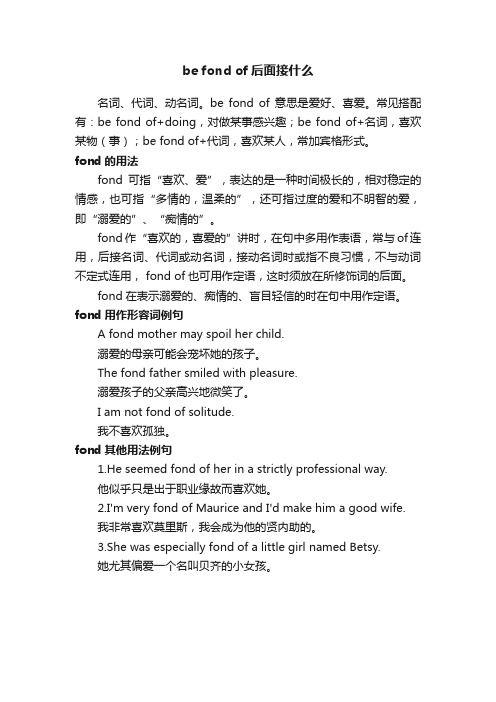
be fond of后面接什么名词、代词、动名词。
be fond of意思是爱好、喜爱。
常见搭配有:be fond of+doing,对做某事感兴趣;be fond of+名词,喜欢某物(事);be fond of+代词,喜欢某人,常加宾格形式。
fond的用法fond可指“喜欢、爱”,表达的是一种时间极长的,相对稳定的情感,也可指“多情的,温柔的”,还可指过度的爱和不明智的爱,即“溺爱的”、“痴情的”。
fond作“喜欢的,喜爱的”讲时,在句中多用作表语,常与of连用,后接名词、代词或动名词,接动名词时或指不良习惯,不与动词不定式连用, fond of也可用作定语,这时须放在所修饰词的后面。
fond在表示溺爱的、痴情的、盲目轻信的时在句中用作定语。
fond用作形容词例句A fond mother may spoil her child.溺爱的母亲可能会宠坏她的孩子。
The fond father smiled with pleasure.溺爱孩子的父亲高兴地微笑了。
I am not fond of solitude.我不喜欢孤独。
fond其他用法例句1.He seemed fond of her in a strictly professional way.他似乎只是出于职业缘故而喜欢她。
2.I'm very fond of Maurice and I'd make him a good wife.我非常喜欢莫里斯,我会成为他的贤内助的。
3.She was especially fond of a little girl named Betsy.她尤其偏爱一个名叫贝齐的小女孩。
爱好喜欢英语短语
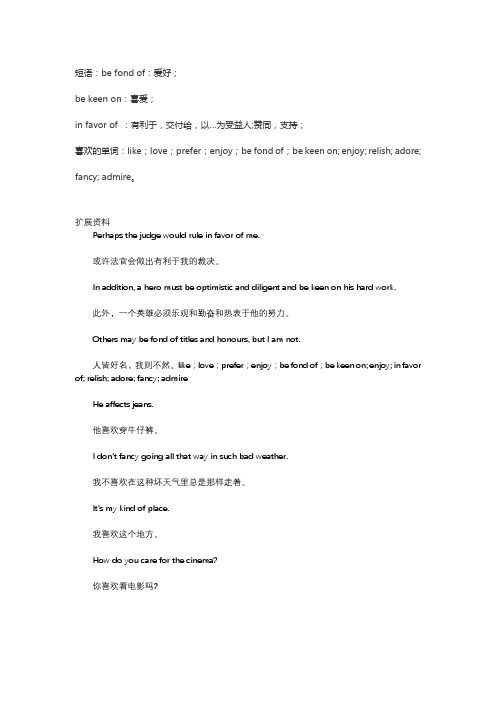
短语:be fond of:爱好;
be keen on:喜爱;
in favor of :有利于,交付给,以…为受益人;赞同,支持;
喜欢的单词:like;love;prefer;enjoy;be fond of;be keen on; enjoy; relish; adore; fancy; admire。
扩展资料
Perhaps the judge would rule in favor of me.
或许法官会做出有利于我的裁决。
In addition, a hero must be optimistic and diligent and be keen on his hard work.
此外,一个英雄必须乐观和勤奋和热衷于他的努力。
Others may be fond of titles and honours, but I am not.
人皆好名,我则不然。
like;love;prefer;enjoy;be fond of;be keen on; enjoy; in favor of; relish; adore; fancy; admire
He affects jeans.
他喜欢穿牛仔裤。
I don't fancy going all that way in such bad weather.
我不喜欢在这种坏天气里总是那样走着。
It's my kind of place.
我喜欢这个地方。
How do you care for the cinema?
你喜欢看电影吗?。
谈论喜好的英语句型
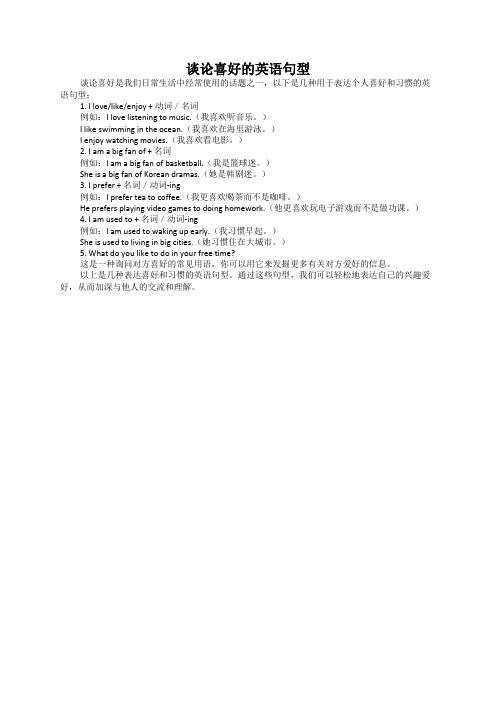
谈论喜好的英语句型谈论喜好是我们日常生活中经常使用的话题之一,以下是几种用于表达个人喜好和习惯的英语句型:1. I love/like/enjoy + 动词/名词例如:I love listening to music.(我喜欢听音乐。
)I like swimming in the ocean.(我喜欢在海里游泳。
)I enjoy watching movies.(我喜欢看电影。
)2. I am a big fan of + 名词例如:I am a big fan of basketball.(我是篮球迷。
)She is a big fan of Korean dramas.(她是韩剧迷。
)3. I prefer + 名词/动词-ing例如:I prefer tea to coffee.(我更喜欢喝茶而不是咖啡。
)He prefers playing video games to doing homework.(他更喜欢玩电子游戏而不是做功课。
)4. I am used to + 名词/动词-ing例如:I am used to waking up early.(我习惯早起。
)She is used to living in big cities.(她习惯住在大城市。
)5. What do you like to do in your free time?这是一种询问对方喜好的常见用语,你可以用它来发掘更多有关对方爱好的信息。
以上是几种表达喜好和习惯的英语句型。
通过这些句型,我们可以轻松地表达自己的兴趣爱好,从而加深与他人的交流和理解。
√与“喜欢”意思相近或同义的各种各样英文表达方法

钟爱/热爱/着迷/喜欢
喜欢c1
How do you care for t喜欢
喜欢c2
Somehow I find there are some plots in politics,and I personally don't go for it.
钟爱/热爱/着迷/喜欢
爱好a
I am fond of /rock music/
替换:
/stamp-collecting/.
我喜好摇滚乐/集邮。[主题]
钟爱/热爱/着迷/喜欢
爱好b1
I am fond of /drawing/.
替换:
/the fine arts/.
我喜好画画/美术。[主题]
钟爱/热爱/着迷/喜欢
I'm crazy about tennis.
我迷上足球了。[主题]
钟爱/热爱/着迷/喜欢
爱上/迷上c
Both of them are nuts about chamber music.
他们俩都热衷于室内乐。[主题]
钟爱/热爱/着迷/喜欢
爱上/迷上d
She adores going to the volleyball match.
她非常喜欢看排球比赛。[主题]
钟爱/热爱/着迷/喜欢
酷爱a1
He had a passion for music.
他酷爱音乐。[主题]
钟爱/热爱/着迷/喜欢
酷爱a2
I like this place.
我喜欢这个地方。[主题]
钟爱/热爱/着迷/喜欢
喜欢a1
It's my kind of place.
我喜欢这个地方。[主题]
like enjoy love的用法 -回复
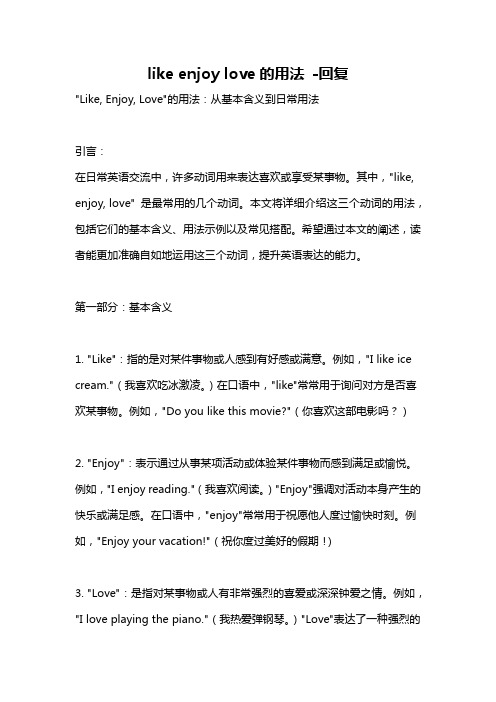
like enjoy love的用法-回复"Like, Enjoy, Love"的用法:从基本含义到日常用法引言:在日常英语交流中,许多动词用来表达喜欢或享受某事物。
其中,"like, enjoy, love" 是最常用的几个动词。
本文将详细介绍这三个动词的用法,包括它们的基本含义、用法示例以及常见搭配。
希望通过本文的阐述,读者能更加准确自如地运用这三个动词,提升英语表达的能力。
第一部分:基本含义1. "Like":指的是对某件事物或人感到有好感或满意。
例如,"I like ice cream."(我喜欢吃冰激凌。
)在口语中,"like"常常用于询问对方是否喜欢某事物。
例如,"Do you like this movie?"(你喜欢这部电影吗?)2. "Enjoy":表示通过从事某项活动或体验某件事物而感到满足或愉悦。
例如,"I enjoy reading."(我喜欢阅读。
)"Enjoy"强调对活动本身产生的快乐或满足感。
在口语中,"enjoy"常常用于祝愿他人度过愉快时刻。
例如,"Enjoy your vacation!"(祝你度过美好的假期!)3. "Love":是指对某事物或人有非常强烈的喜爱或深深钟爱之情。
例如,"I love playing the piano."(我热爱弹钢琴。
)"Love"表达了一种强烈的情感,可以用于家人、朋友、伴侣以及对某事物的热爱。
第二部分:用法示例1. "Like"的用法示例:- I like going to the beach.(我喜欢去海滩。
)- She likes watching romantic movies.(她喜欢看浪漫电影。
1常用动名词的短语 enjoy
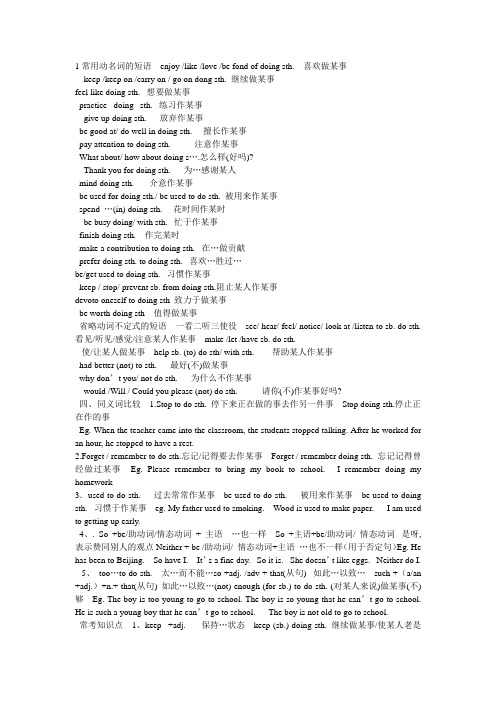
1常用动名词的短语enjoy /like /love /be fond of doing sth. 喜欢做某事keep /keep on /carry on / go on dong sth. 继续做某事feel like doing sth. 想要做某事practice doing sth. 练习作某事give up doing sth. 放弃作某事be good at/ do well in doing sth. 擅长作某事pay attention to doing sth. 注意作某事What about/ how about doing s….怎么样(好吗)?Thank you for doing sth. 为…感谢某人mind doing sth. 介意作某事be used for doing sth./ be used to do sth. 被用来作某事spend …(in) doing sth. 花时间作某时be busy doing/ with sth. 忙于作某事finish doing sth. 作完某时make a contribution to doing sth. 在…做贡献prefer doing sth. to doing sth. 喜欢…胜过…be/get used to doing sth. 习惯作某事keep / stop/ prevent sb. from doing sth.阻止某人作某事devoto oneself to doing sth 致力于做某事be worth doing sth 值得做某事省略动词不定式的短语一看二听三使役see/ hear/ feel/ notice/ look at /listen to sb. do sth. 看见/听见/感觉/注意某人作某事make /let /have sb. do sth.使/让某人做某事help sb. (to) do sth/ with sth. 帮助某人作某事had better (not) to sth. 最好(不)做某事why don’t you/ not do sth. 为什么不作某事would /Will / Could you please (not) do sth. 请你(不)作某事好吗?四、同义词比较 1.Stop to do sth. 停下来正在做的事去作另一件事Stop doing sth.停止正在作的事Eg. When the teacher came into the classroom, the students stopped talking. After he worked for an hour, he stopped to have a rest.2.Forget / remember to do sth.忘记/记得要去作某事Forget / remember doing sth. 忘记记得曾经做过某事Eg. Please remember to bring my book to school. I remember doing my homework3.used to do sth. 过去常常作某事be used to do sth. 被用来作某事be used to doing sth. 习惯于作某事eg. My father used to smoking. Wood is used to make paper. I am used to getting up early.4、. So +be/助动词/情态动词+ 主语…也一样So +主语+be/助动词/ 情态动词是呀,表示赞同别人的观点Neither + be /助动词/ 情态动词+主语…也不一样(用于否定句)Eg. He has been to Beijing. So have I. It’s a fine day. So it is. She doesn’t like eggs. Neither do I.5、too…to do sth. 太…而不能…so +adj. /adv + that(从句) 如此…以致…such +(a/an +adj.)+n.+ that(从句) 如此…以致…(not) enough (for sb.) to do sth. (对某人来说)做某事(不)够Eg. The boy is too young to go to school. The boy is so young that he can’t go to school. He is such a young boy that he can’t go to school. The boy is not old to go to school.常考知识点1、keep +adj. 保持…状态keep (sb.) doing sth. 继续做某事/使某人老是做某事eg. Everyone should keep our classroom clean. It’s too late, but he still keeps working. Lily always keeps us waiting for her.2、make + n. 使某人成为make + sb. + adj. 使某人…make sb. do sth. 使某人做某事Sb. be made to sth. 某人被迫做某事Eg. We made Peter our monitor. Books make us happy. He often makes me laugh. The workers were made to work 12 hours a day.3、I don’t think that 我认为…不Eg. I don’t think you are right.4、It’s /was/has been+ some time +since+一般过去时…自从…以来有多久了Eg. It has been two years since we met last time.5、What do you mean by/ What does .. mean? 是什么意思?Eg. What do you mean by “computer”?/What does “computer”mean?6、What do you think of…/How do you like …? 你认为…怎么样? Eg. What do you think of this film /How do you like this film?7.What is/was/will …be like? ..怎么样? Eg. What is the weather like? What will the life in the future be like?8、It’s said/ reported that…据说/据报道Eg. It’s said that the population of the word would be 6 billion in2o5o.9、one of the 形容词最高级+名词复数…其中之一Eg. Shanghai is one of the biggest cities in China.10、Neither…nor…既不…也不(两者都不)either or…要么…要么/或者…或者/不是…就是not only…but also…不但…而且以上三个词做主语时,要用就近原则Eg. Neither you nor he has been to the USA. Either he or you go to the park. Not only my mother but also my father is a teacher.11、比较级+ than +any other +名词单数…比其余任何一个…比较级+ than + the other+名词复数Eg. Shanghai is bigger than any other city/the other cities in China.12、When(当…的时候), if (如果), as soon as(一…就), until(直到…才), unless(除非/如果…不)这几个词引导的时间或条件状语从句时,主句要用一般将来时.Eg. I will call you when he comes. If it doesn’t rain tomorrow, we will have a picnic. As soon as I get to Beijing, I’ll come to see you. He won’t go to bed until his parents come back. Unless you work hard, you won’t catch up with other s.。
仁爱版unit3ourhobbies

Section A
Maker: Yang Xiaohong
1.学习用enjoy ,like, love, prefer, be fond of和be interested in表达自己 的兴趣和爱好.
2.学习used to的用法.
Question: What are your hobbies?
dance
skate
Lucy _u_s_e_d_ __t_o__ enjoy _d_a_n_c_i_n_g_, but now she prefers _s_k_a_t_i_s_e_d_ __to___ enjoy _s_le_e_p_i_n_g__, but now he likes _r_e_a_d_i_n_g.
1a. Listen, read and say.
Michael: Hi, Maria !
Maria: Hi, pleasedd t?o see you! Michael: Wow! WWhat bbeeaauut?tiiffuullsstatmamppss!! Collecting stamps
喜欢做某事:
like + doing sth love + doing sth enjoy + doing sth prefer + doing sth
be fond of + doing sth be interested in + doing sth
Practice
What do you like doing? I like …
rurunning
What are you fond of doing? I am fond of…
- 1、下载文档前请自行甄别文档内容的完整性,平台不提供额外的编辑、内容补充、找答案等附加服务。
- 2、"仅部分预览"的文档,不可在线预览部分如存在完整性等问题,可反馈申请退款(可完整预览的文档不适用该条件!)。
- 3、如文档侵犯您的权益,请联系客服反馈,我们会尽快为您处理(人工客服工作时间:9:00-18:30)。
enjoy, like, love, prefer和be fond of都可表达“喜爱”的意思,但含义和用法有所不同。
1. enjoy在意思上侧重于“享受某种乐趣”,后接名词或动名词作宾语,不能接不定式。
enjoy还可以与反身代词连用,即“enjoy oneself”,表示“玩得很高兴”,
enjoy oneself=have a good/great time。
have a hard/difficult time with sth.,have a hard time doing sth.,
“难过”、“处理……很棘手,做某事很困难”。
eg ▲The man is enjoying his dinner.
那个男人正津津有味地吃饭。
▲My father enjoys listening to the radio.
我父亲爱听广播。
▲Did the children enjoy themselves in the park?
孩子们在公园里玩得愉快吗?
2. like意为“喜欢、喜爱”,是一般用语,主要是指对某人或某物产生好感或发生兴趣,
不带有感情色彩,后面可接名词、代词、动名词、动词不定式作宾语。
eg ▲Everyone in China likes Mid-Autumn Day.
在中国,每个人都喜欢中秋节。
3. love表示“爱、热爱、爱戴”,有强烈的感情,
相当于like...very much,侧重于对祖国及较亲近的人的深厚感情。
在口语中它往往又指一般的喜爱,这时与like的意思很相近,可以互换。
后面也可以接名词、动名词或动词不定式。
eg ▲They love playing/to play basketball.
他们爱打篮球。
like和love都可与would, should连用,表示“想要做某事”。
eg ▲I'd like/love to go with you.
我想和你们一起去。
4. prefer意为“(比较)喜欢、宁愿”,相当于like...better,它的“喜欢”是带有选择性的,
是在比较的情况下选择出来的,其后接名词、代词、动名词或不定式。
eg ▲I prefer going by bike.
我宁愿骑车去。
▲He prefers to work alone.
他喜欢独自工作。
prefer常用于prefer...to...结构中,意为“喜欢……而不喜欢……、宁愿……而不……”,
其中to是介词,prefer与to后都接名词或动名词。
eg ▲I prefer foreign languages to maths.
外语和数学相比,我更喜欢外语。
▲He prefers doing to talking.
他喜欢做而不喜欢说。
5. be fond of意思是“喜欢;爱好”,语意比like强,但比love 弱,其后不能接不定式。
eg ▲He is fond of reading.
他爱好读书。
6. go in for爱好,对……感兴趣;参加,从事于
eg ▲More and more people are going in for table tennis.
爱打乒乓的人越来越多了。
▲Over a thousand students went in for this examination.
参加这次考试的学生有一千多名。
